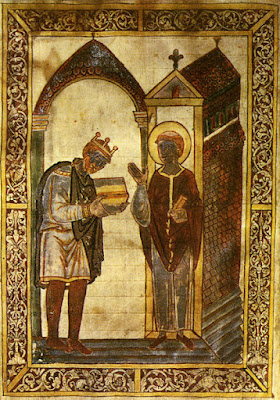VENERABLE BEDE (MAY 25)
 |
| A Modern Remake of a Traditional Icon of St. Bede of Northumbria |
By Bp. Joseph Boyd (Ancient Church of the West)
The Venerable Bede, also known as St. Bede, stands as a towering figure in the history of Christian scholarship and Western Orthodoxy. Born in AD 672 or 673 in the Anglo-Saxon kingdom of Northumbria, St. Bede was sent to the monastery of St. Peter at Monkwearmouth at the tender age of seven. There, under the guidance of Benedict Biscop and later at the twin monastery of St. Paul at Jarrow, St. Bede immersed himself in a life of prayer, study, and monastic discipline.
St. Bede was ordained a deacon at the age of 19 and a priest at 30, which was notably early at the time, when age was still thought to be a primary consideration for Presbyters, reflecting his exceptional piety and learning. His entire life was spent within his monastic cell, yet his influence reached far beyond them, influencing the whole kingdom of Northumbria. St. Bede's dedication to monastic ideals was coupled with a relentless pursuit of knowledge, which earned him the title "Venerable,” meaning “worthy of respect,” even during his lifetime.
LATIN VULGATE
St. Bede's scholarly works encompass a vast corpus of subjects, from theology and biblical exegesis to science and poetry. Among his most significant contributions was his meticulous work on the Latin Vulgate Bible. Building on the foundation laid by St. Jerome, St. Bede made extensive corrections and annotations, ensuring that this Latin version was as accurate and accessible as possible for the clergy and scholars of the time. His attention to detail and commitment to the truth of the Scriptures solidified the Vulgate’s authority in the Western Church for centuries, ensuring that Latin became the primary liturgical language throughout time.
ECCLESIASTICAL HISTORY
St. Bede's magnum opus, the "Ecclesiastical History of the English People" ("Historia Ecclesiastica Gentis Anglorum"), completed in AD 731, is a cornerstone of all English historical writing. This work provides an invaluable record of early Celtic British history, covering the period from Julius Caesar's invasion of Britain to St. Bede’s day. St. Bede's balanced approach, combining historical narrative with hagiography, ensures that his work remains a critical primary source for historians and theologians, offering a unique perspective on the development of the Christian Church in Great Britain.
 |
| A Contemporary Celtic-Style Icon of the Venerable Bede |
LEGACY
The holy life and profound scholarly works of the Venerable Bede stand as a testament to the enduring power of our Christian faith, historical learning, and Orthodox devotion. May his example continue to inspire and guide us in our own journeys of faith and scholarship within the Ancient Church of the West.
COLLECT
"O ALMIGHTY GOD, who hast enlightened thy Church by the learning of thy blessed servant Bede: Enrich us more and more, we beseech thee, with that knowledge which is ours by his teaching, and let thy light so shine through us, that we may glorify thee before all men; through Jesus Christ our Lord, who livest and reignest with thee, in the unity of the Holy Ghost, ever one God. World without end. Amen."
 |
| An Ancient Manuscript Icon of the Venerable Saint Bede Counseling the Saint King Oswald of Northumbria |


Comments
Post a Comment